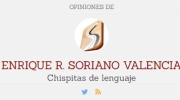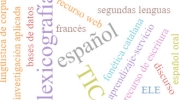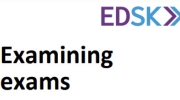Actualidad ELE
 (05/05/23)
(05/05/23)
Aunque pueda parecer insólito, un reciente proyecto legislativo (Proyecto de Real Decreto), que afecta a toda la Universidad española, propone eliminar la lingüística como área de conocimiento, de manera que todo el profesorado de lingüística, actual y futuro, carecería de un área propia de adscripción, lo cual implicaría suprimir el reconocimiento académico de los lingüistas, así como el de su actividad docente. Infoling, en tanto que red global que contribuye a la labor de difusión de información sobre lingüística, en particular, la lingüística hispánica entendida en su sentido más amplio, desea expresar su apoyo unánime a las alegaciones y objeciones presentadas ante el Ministerio de Universidades por parte de departamentos y áreas de lingüística, departamentos de lengua y literatura españolas –en sus diversas denominaciones–, así como otros departamentos vinculados con los estudios de lingüística en España.
 (04/05/23)
(04/05/23)
Texto completo de la convocatoria ![]()
ORDEN CYT/554/2023, de 25 de abril, por la que se establecen las bases reguladoras para la concesión de subvenciones destinadas a financiar la creación de empresas y la innovación tecnológica en el sector de la enseñanza del español para extranjeros.
"El plazo de presentación de las solicitudes será el que se fije en la convocatoria, sin que pueda ser inferior a quince días naturales a contar desde el día siguiente al de la publicación del extracto de ésta en el Boletín Oficial de Castilla y León (4 de mayo)."
 (27/04/23)
(27/04/23)
Engaging learners by connecting them to a vivid, multisensory and powerful real-time virtual experience is an effective way to develop knowledge and skills. That is the promise of the immersive technologies known as augmented and virtual reality (AR/VR).
The technology is delivering.
 (03/05/23)
(03/05/23)
Permitirá que el centro salmantino ponga en marcha un proyecto piloto para formar como profesores de español a estudiantes procedentes de países estratégicos para la enseñanza de esta lengua.
El Consejo de Ministros ha aprobado en su reunión de este miércoles una inversión de 2,5 millones de euros procedente de los fondos europeos Next Generation para el Centro Internacional del Español, ubicado en Salamanca y perteneciente a la Usal. La cantidad irá destinada, por un lado, a la búsqueda de nuevos mercados para incrementar la presencia del español en el mundo y, por otro, servirá para aplicar nuevos modelos, basados en la inteligencia artificial, para mejorar su enseñanza.
 (01/05/23)
(01/05/23)
La semana pasada di cuenta de la presencia de Concepción Compagny Compagny, integrante de la Academia Mexicana de la Lengua, en la Biblioteca Central de Guanajuato, en León. Me centré en cómo hablamos los mexicanos. No faltó quien, con la gentileza de haber leído mi comentario, cuestionó «Pero ¿hablamos bien o hablamos mal los mexicanos?».
Me gana la tentación de usar una frase muy popular en otros tiempos (parafraseada). Ni hablamos bien, ni mal; sino todo lo contrario (entiendo que es un absurdo; pero hay una razón).
 (28/04/23)
(28/04/23)
Se ha publicado el volumen 2 de la revista TEISEL. Tecnologías para la investigación en segundas lenguas.
 (26/04/23)
(26/04/23)
El director del Instituto Cervantes, Luis García Montero, viaja a Boston (Estados Unidos) para participar este jueves 27 en el 10º aniversario del Observatorio de la lengua española y las culturas hispánicas en los Estados Unidos. Ubicado en la Universidad de Harvard, es el único centro de la red del Cervantes dedicado principalmente a la labor de investigación sobre la situación de la lengua española en Estados Unidos, sus características y enseñanza; así como sobre las culturas españolas, hispanoamericanas e hispanas, y en especial de sus literaturas.
 (26/04/23)
(26/04/23)
Por quinta ocasión la Comisión Económica para África (ECA) celebró hoy el Día de la Lengua Española, con el objetivo de promover su uso como uno de los idiomas oficiales en sus actividades.
 (21/04/23)
(21/04/23)
Over 300 years since the first written exam was used in the English education system, this traditional form of assessment continues to divide opinion. To their supporters, written exams provide a rigorous test of students’ knowledge and understanding that acts as a source of motivation as well as a sound basis for progression onto university or employment. Indeed, Prime Ministers, Education Secretaries, Schools Ministers and regulators have publicly stated that written exams are the ‘best and fairest’ way to measure pupils’ attainment. Meanwhile, critics argue that written exams are narrow assessments that focus too much on memorisation and fail to provide students with the wide range of skills that they need for later life and work.
 (23/04/23)
(23/04/23)
Más de 54 millones de los 531 millones de hispanohablantes del mundo viven en Estados Unidos. ¿Impresionante verdad? El español es el segundo idioma más hablado en EEUU y tiene una gran influencia en la cultura estadounidense.
En vista del Día Internacional del español que se celebra el 23 de abril, la agencia de impacto LSG publicó una encuesta realizada en 2023 que revela las principales percepciones, prioridades y expectativas con respecto a la lengua española entre los votantes frecuentes de Estados Unidos.
Pages
Descripción de la sección
En esta sección se recogen noticias publicadas en medios de comunicación y redes sociales relacionadas con la enseñanza de ELE. También tienen cabida en ella noticias personales de los usuarios de Todoele, siempre que tengan alguna relación con la enseñanza de ELE.
